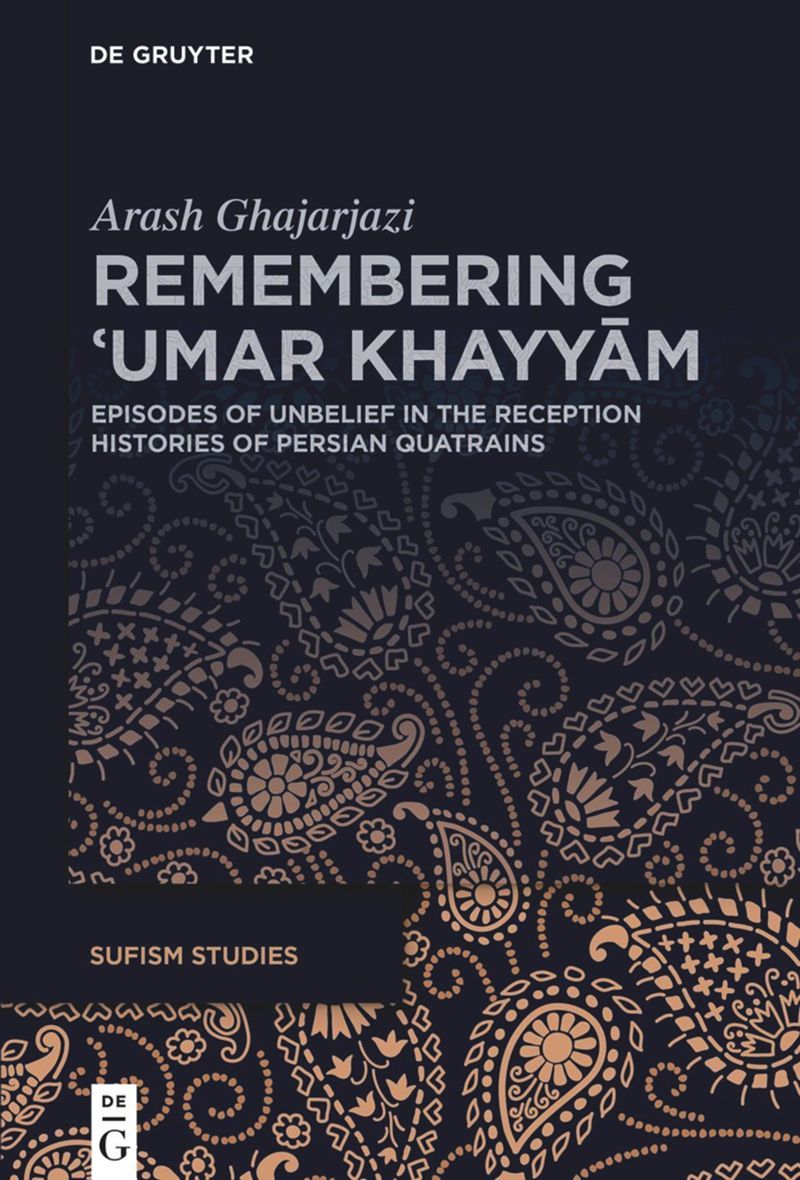‘Umar Khayyám’s Transgressive Ethics and their Socio-Political Implications in Contemporary Iran. A.A. Seyed-Gohrab
In: Sufi non-conformism : antinomian trends in the Persianate cultural traditions. A.A. Seyed-Gohrab (ed.) Amsterdam : Leiden University Press, 2024. (Iranian Studies Series; 32) ISBN: 9789087284541. Pp. 155–177
Archives
Remembering ‘Umar Khayyám
Remembering ‘Umar Khayyám. Episodes of Unbelief in the Reception Histories of Persian Quatrains. Arash Ghajarjazi. Berlin, De Gruyter, 2025. 340 p., 18 illus. ISBN: 9783111617077. (Sufism studies; 3)
This book explores the Persian sage ʿUmar Khayyām and the globally renowned quatrains (rubāʿiyyāt) attributed to him from a new angle. These quatrains have unleashed responses from Sufis and Islamic theologians, fostering secular thought in the Persianate world. From the early 12th century to the present, ʿUmar Khayyām’s persona has been a source of inspiration for various literate communities. This monograph addresses an undesirable gap in Khayyām scholarship by re-examining the reception of his quatrains within a changing collective memory. It investigates a wide range of texts and objects, including Sufi texts, chronicles, mystical poetry anthologies, memorial monuments, Victorian illustrations, and modern periodicals. The focus is on how the remembrance of Khayyām has contributed to the formation of a secular intellectual tradition in modern Iran. The book argues for a re-conceptualisation of Khayyām as a nexus of Sufi literature, memory, and secularity. Additionally, it critically examines traditional scholarship on Khayyām’s biography and the debates regarding the authenticity of his quatrains. This work aims to connect scholars of Sufism Studies, memory studies, and Persian and Islamic Studies.
Quatrains of Many Receptions
Quatrains of Many Receptions: A Survey of Perceptions of ‘Omar Khayyām in Ottoman and Turkish Translations. Efe Murat Balıkçıoğlu
In: Iranian Studies, Vol. 57 (2024), 2, pp. 221–239
This article explores the wide range of responses to Persian polymath and poet ‘Omar Khayyām (d. ca. 526/1132) in Ottoman and Turkish literary sources. There is an extensive bibliography of translations and secondary literature.
The Afterlife of Edward FitzGerald s Poem
The Afterlife of Edward FitzGerald s Poem. A Comparative Study of FitzGerald’s Rubáiyát and Housman s A Shropshire Lad. Mostada Hosseini
In: Contemporary Literary and Cultural Studies , (2018) 1, p. 19-34
Khayyam, Omar vii. Translations into Italian
Khayyam, Omar vii. Translations into Italian. Casari, Mario.
Encyclopaedia Iranica Online, May 2014.
The reception of Khayyam’s poetic work in Italy, as in the rest of Europe, was the result of the translation and rewriting of the English poet Edward FitzGerald (d. 1883) in the years 1859-79. In Italy the more scholarly approach to Khayyam’s work by a few dedicated Iranists proceeded at a fitful pace over many decades.
The Fin de Siècle cult of FitzGerald’s “Rubaiyat” of Omar Khayyam
The Fin de Siècle cult of FitzGerald’s “Rubaiyat” of Omar Khayyam. John D. Yohannan.
In: Edward FitzGerald’s The Rubáiyat of Omar Khayyám. Ed. by H. Bloom. Philadelphia, Chelsea House, 2004. p. 5-19.
(From Review of National Literatures 2, no. 1.)
Yohannan describes how the Rubaiyat was recognised as “a disintegrating spiritual force in England and America” and how in the Omar Khayyam clubs the veneration for the translator tended to surpass worship of the poet.
Fugitive articulation: an introduction to The Rubáiyát of Omar Khayyám
Fugitive articulation: an introduction to The Rubáiyát of Omar Khayyám. D Schenker.
In: Edward FitzGerald’s The Rubáiyát of Omar Khayyám. Ed. by H. Bloom. Philadelphia, Chelsea House, 2004. p. 59-76.
(From Victorian Poetry 19, no. 1.)
Schenker takes an innovative and challenging look at the Rubaiyat, questioning why we fail today to respond to it as a work of serious literary art (p. 60). The author compares its effect on an audience with that of an “unimpeachable contemporary masterpiece, T.S. Eliot’s “The Love Song of J. Alfred Prufrock”. The Rubaiyat’s wide appeal might be that it “institutionalizes a cult of spiritual resignation” and that it is “sufficiently void of meaning to be recyclable in any number of contexts”. In his analysis of the poem, the author recognises its “verbal claustrophobia”.
